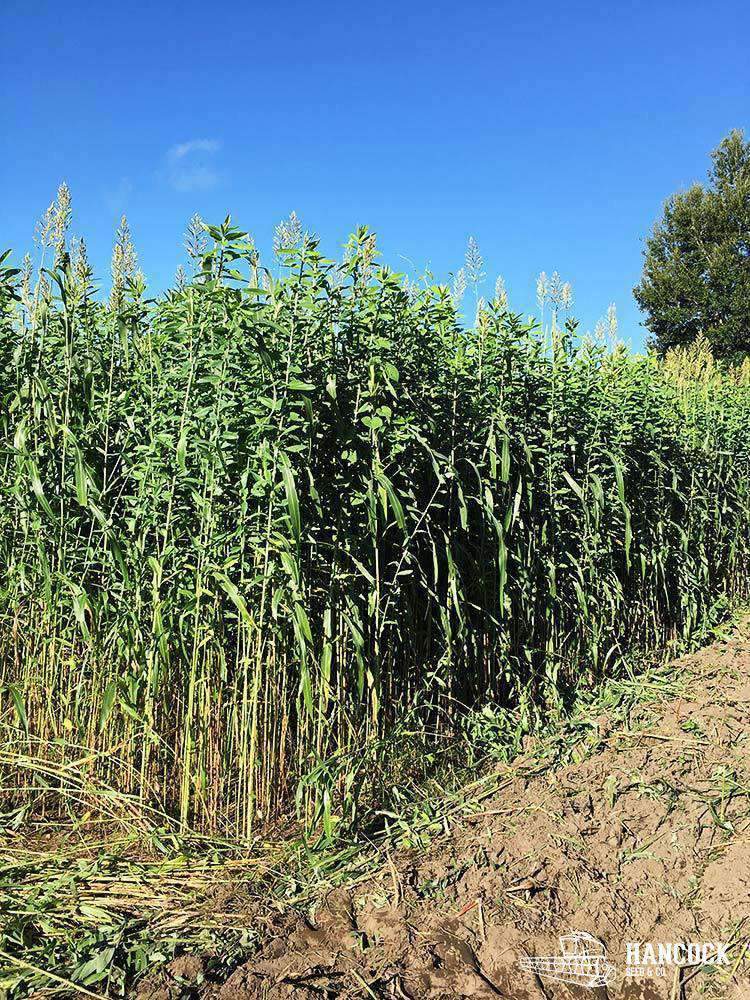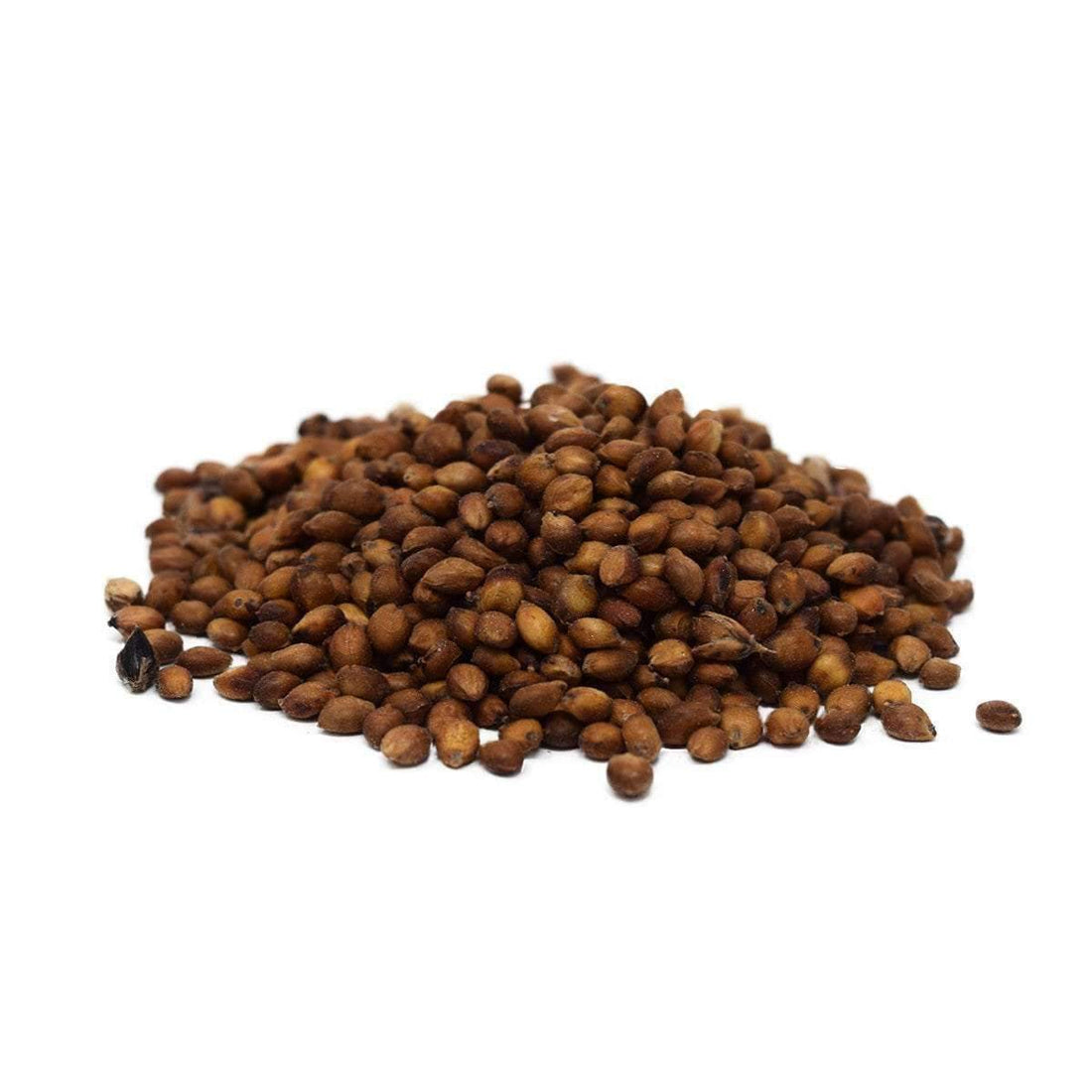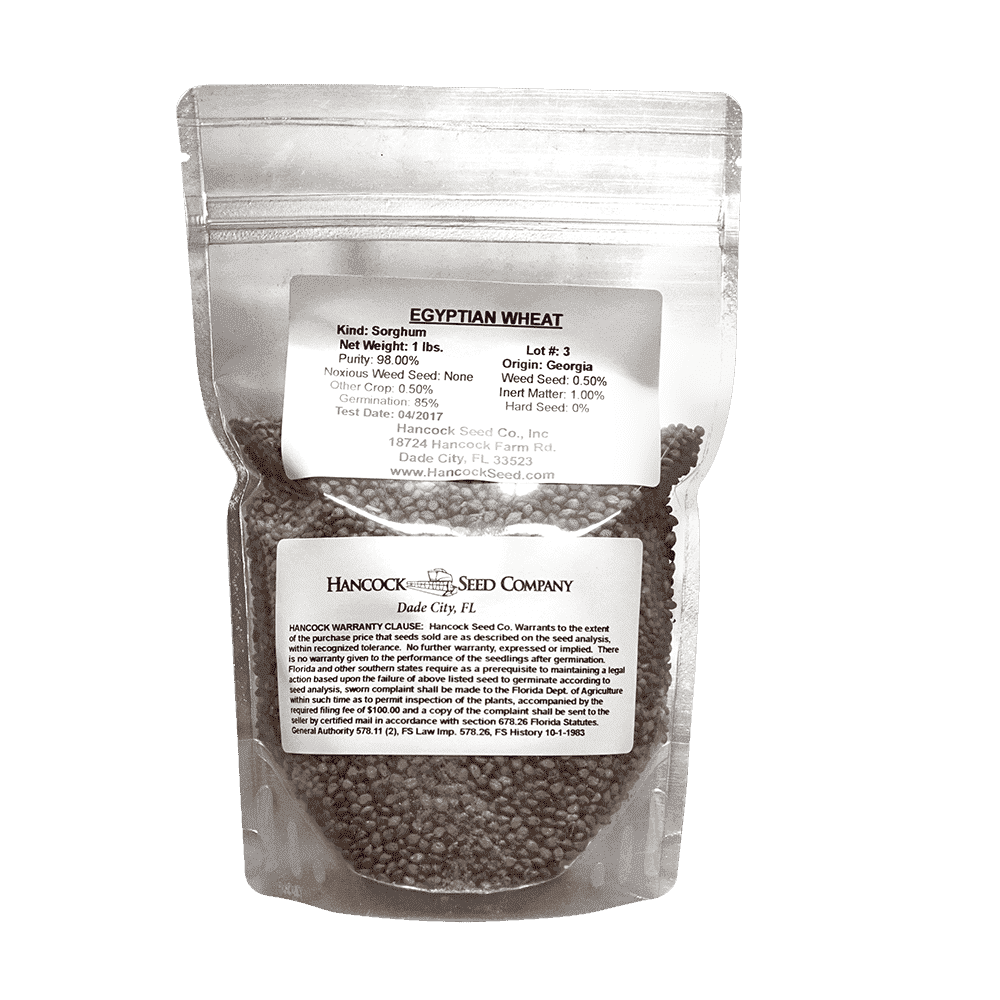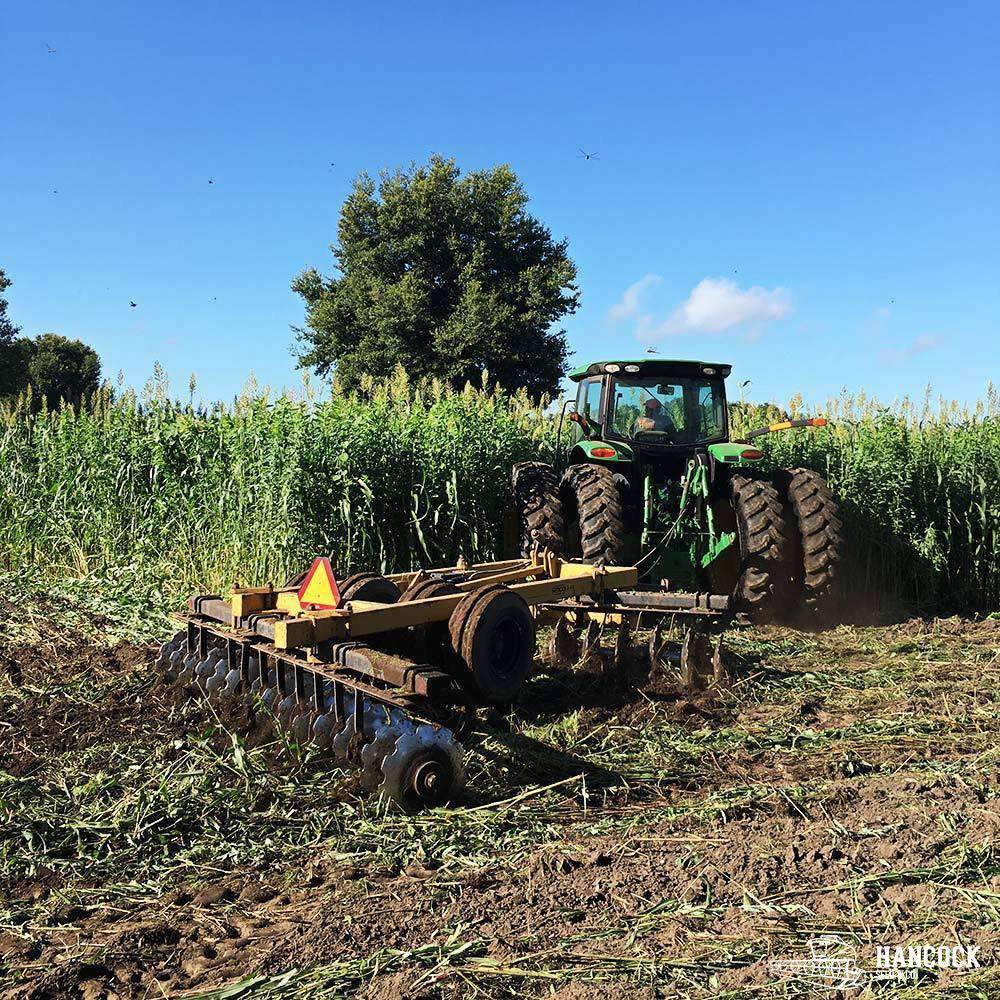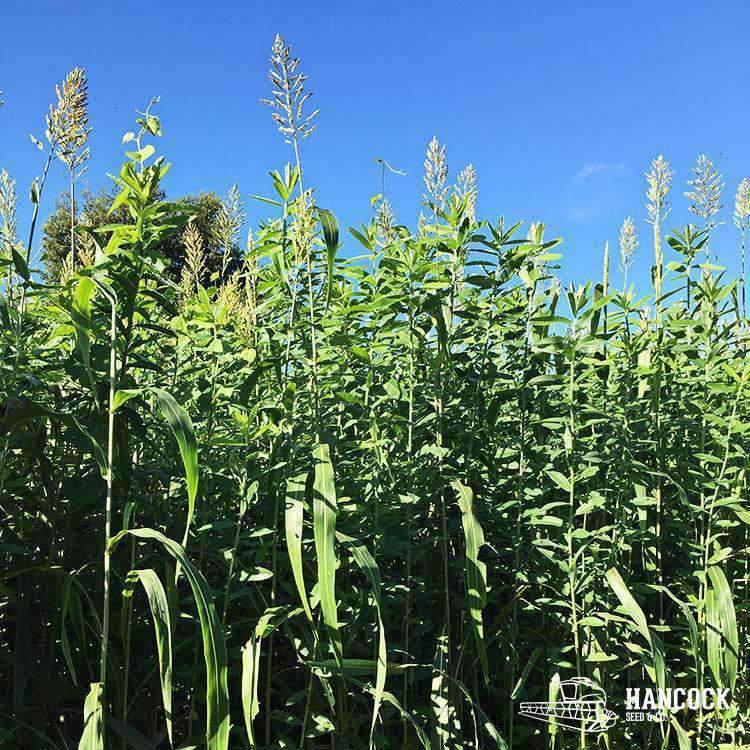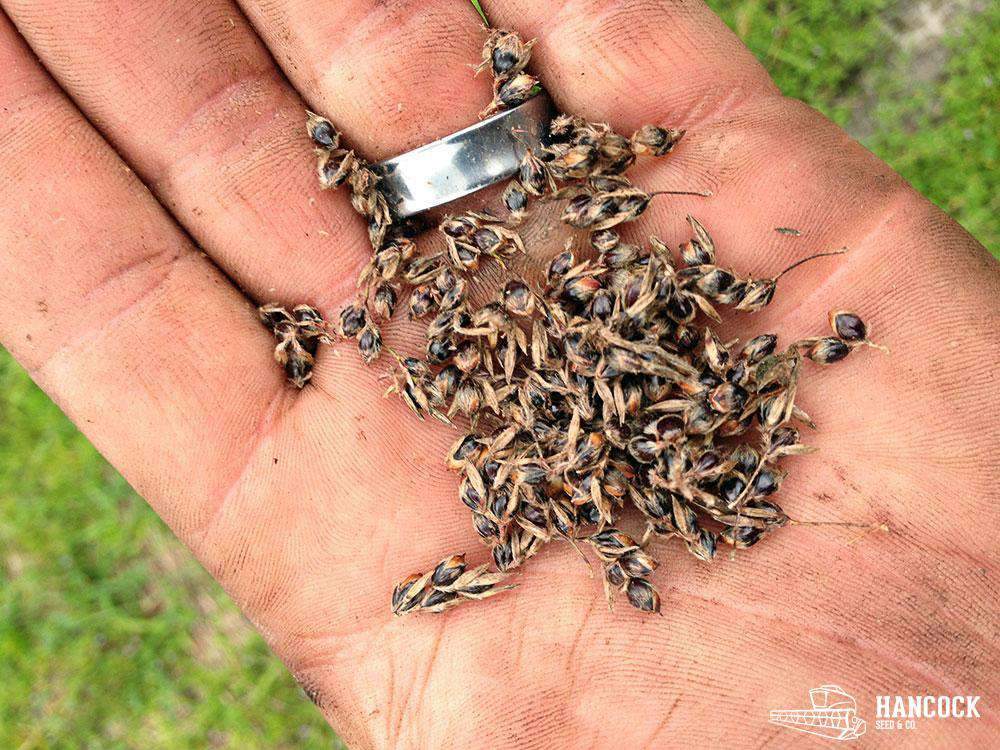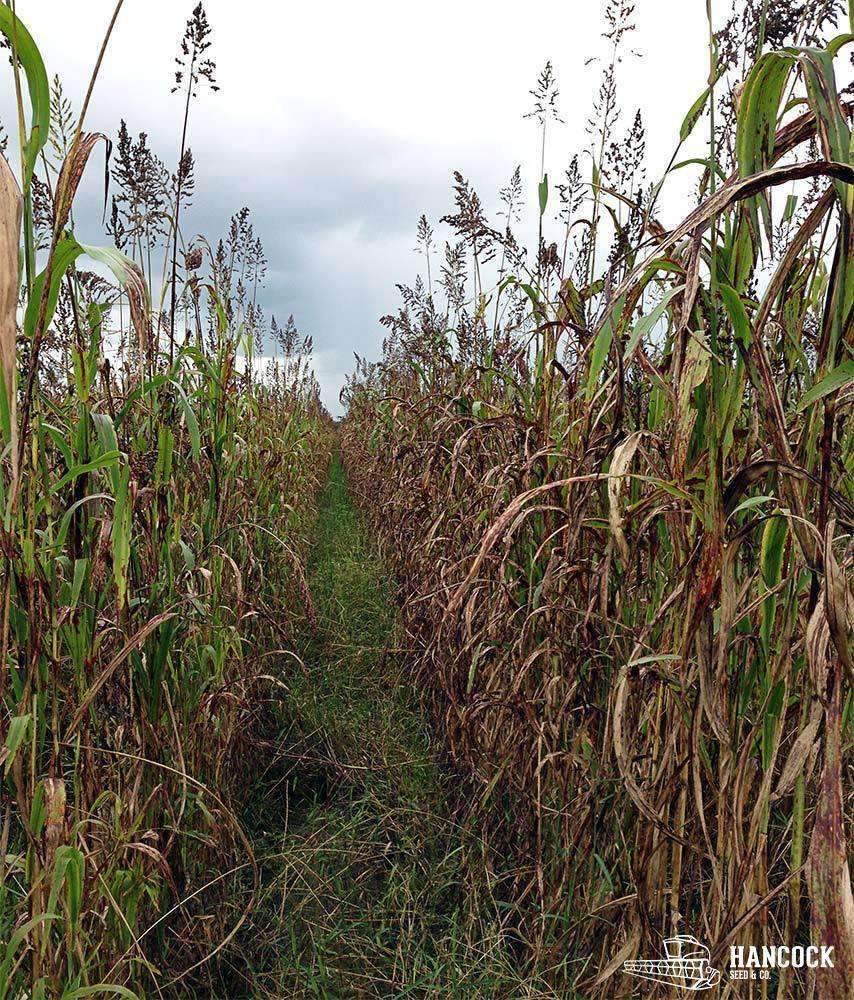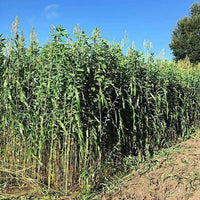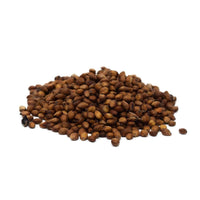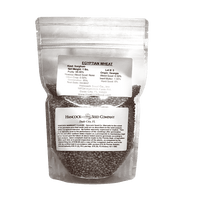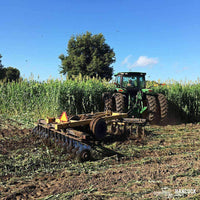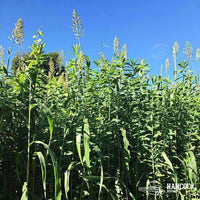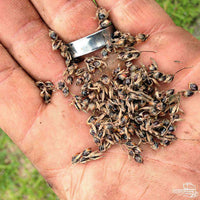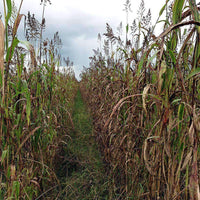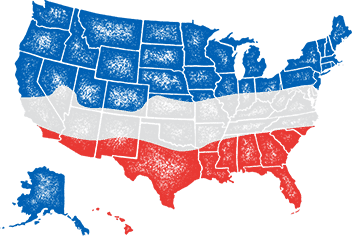
- When to plant:
- Spring, Summer
- Fertilizer:
- 10-10-10 All Purpose Fertilizer
- Seeding rate:
- 30 - 50 lbs. per acre
- Overseeding rate:
- 25 lbs. per acre
- Seeding depth:
- 1/2 inch
- Ideal ph:
- 5.5 - 7.0
- Gmo:
- No
- Inoculant needed:
- No
- Coated or raw:
- Raw
- Lifecycle:
- Annual
- Climate zones:
- Cool Season, Transition Zone, Warm Season
Egyptian Wheat is a tall growing (10 ft.) member of the sorghum family that is well adapted to the Southeast. Egyptian Wheat bears loose seed heads containing an abundance of seed used for cover crops, wildlife and soil building.
Product Information
- Application or Use: Pasture, Food Plot, Cover Crop, Soil Amendment
- Germination Time: 7 - 14 days, under optimal conditions
- Growing Locations: Warm Season, Transition Zone, Cool Season
- Height: 8 - 10 feet
- Sunlight Requirements: 8+ hours, full sun for best results
- Advantages: Provides cover for game birds, deer, turkey, and other wildlife.
- When to Plant: Recommended planting time is spring and summer when night time temperatures are consistently 65+ degrees.
Product Details
- Well suited for game birds
- Provides great cover for quail and other game birds
- Will mature approximately 110 days after emergence
- Preferred in plots for game birds
- High protein seed production
Product Information
Egyptian Wheat is well suited for game birds, especially quail. Egyptian Wheat provides great cover for quail and other game birds while also dropping seed over 180 - 200 days. Seed will mature approximately 110 days after emergence. Egyptian wheat also makes excellent cover for quail.
Egyptian Wheat is a commonly known as shallu or chicken corn. Egyptian Wheat has a misleading name (wheat) but it is actually a member of the Sorghum family. Egyptian Wheat is a tall growing species (10 ft) of sorghum that matures in approximately 110 days. The best time for planting is after the last chance of frost in the spring for summer food plots. Egyptian Wheat is especially preferred in plots for game birds due to its high protein seed production. Egyptian wheat also provides excellent cover for quail and other game birds.
The placement of Egyptian Wheat can have a huge strategic impact on your plot. Many hunters like to create smaller, "micro" plots, using Egyptian Wheat. The very tall Egyptian Wheat (more than 10 feet) can be used to create "walls" for a smaller section of food plot, where the deer feel more comfortable. This is the best area in your food plot to set up a blind, enclosure or hunting stand.
*Product packaging may appear different than what is pictured.
Egyptian Wheat Seed will thrive in any one of the three climate zones, and should be planted during either the Spring or the Summer. Spread Egyptian Wheat seed at a rate of 30 to 50 lbs. per acre, and fertilize with a high-nitrogen blend of fertilizer. Cover seed at a depth of half-an-inch. Egyptian should reach its peak maturity after 110 days, and will continue to drop seed until between 180 and 200 days.
The seed heads will shatter naturally when they reach maturity, however for best results, hunters interested in attracting turkey, wild quail and doves should use a mechanical means to knock down at least some of the plants. Deer aren't the only mammals that enjoy the taste of Egyptian Wheat; squirrels are known to climb up the tall-growing stalks and getting to the seeds before anybody else.
Many food plot planters have had success when combining both Egyptian Wheat seed and Cowpea seed to create a plot that attracts all manners of mammals and game fowl. The Egyptian Wheat provides all of its usual benefits, such as providing cover for deer and an excellent source of forage for turkey, doves, and quail, but its strong stalks provide a base that the Cowpeas can use to gain elevation off the ground. The Cowpeas will provide further forage for the deer to feed on during the Summer months. This combination will provide a nearly year-round blend of forages for deer, squirrel and most desired bird species.
When choosing to start a new lawn, remove old vegetation by using a de-thatcher, power rake or tiller to kill the existing vegetation. Rake or drag the area to remove debris and dead grass for a clean area. Ensure the soil is leveled and loosened to allow the seed to have good soil contact once spread on a clean seed bed.
If you have an area with heavy weed coverage, we recommend starting fresh by killing and removing the existing vegetation. If you choose to use chemicals, herbicides or fertilizers, you must check with the product's manufacturer prior to planting new seed to ensure the proper waiting period.
When overseeding an existing area, mow your lawn at the lowest setting and bag the clippingsx. Rake or drag any areas that have dead thatch or debris.

Seed Quality
Hancock Seed is dedicated to delivering the best seeds possible to our customers. Hancock Seed grows and harvests many of our products, and we acquire the majority of the rest from other family farmers.
All these seeds are processed, packaged and shipped from Hancock Farm. This helps us ensure that our high standards are met. Unlike much of the competition, we refuse to sell you a seed that was not gathered during the last harvest. You will always receive fresh product from Hancock.
Every seed we grow comes with 40 years of experience behind it...you can rest assured that all of our products are cultivated in a method that assures its potential for growth.
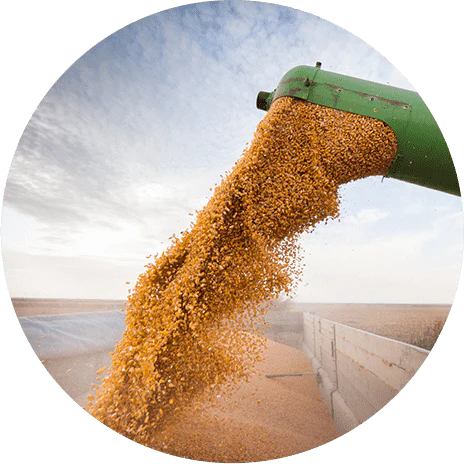
Your cart ( 0 )

Egyptian Wheat is a tall growing (10 ft.) member of the sorghum family that is well adapted to the Southeast. Egyptian Wheat bears loose seed heads containing an abundance of seed used for cover crops, wildlife and soil building.
Product Information
- Application or Use: Pasture, Food Plot, Cover Crop, Soil Amendment
- Germination Time: 7 - 14 days, under optimal conditions
- Growing Locations: Warm Season, Transition Zone, Cool Season
- Height: 8 - 10 feet
- Sunlight Requirements: 8+ hours, full sun for best results
- Advantages: Provides cover for game birds, deer, turkey, and other wildlife.
- When to Plant: Recommended planting time is spring and summer when night time temperatures are consistently 65+ degrees.
Product Details
- Well suited for game birds
- Provides great cover for quail and other game birds
- Will mature approximately 110 days after emergence
- Preferred in plots for game birds
- High protein seed production
Product Information
Egyptian Wheat is well suited for game birds, especially quail. Egyptian Wheat provides great cover for quail and other game birds while also dropping seed over 180 - 200 days. Seed will mature approximately 110 days after emergence. Egyptian wheat also makes excellent cover for quail.
Egyptian Wheat is a commonly known as shallu or chicken corn. Egyptian Wheat has a misleading name (wheat) but it is actually a member of the Sorghum family. Egyptian Wheat is a tall growing species (10 ft) of sorghum that matures in approximately 110 days. The best time for planting is after the last chance of frost in the spring for summer food plots. Egyptian Wheat is especially preferred in plots for game birds due to its high protein seed production. Egyptian wheat also provides excellent cover for quail and other game birds.
The placement of Egyptian Wheat can have a huge strategic impact on your plot. Many hunters like to create smaller, "micro" plots, using Egyptian Wheat. The very tall Egyptian Wheat (more than 10 feet) can be used to create "walls" for a smaller section of food plot, where the deer feel more comfortable. This is the best area in your food plot to set up a blind, enclosure or hunting stand.
*Product packaging may appear different than what is pictured.
Egyptian Wheat Seed will thrive in any one of the three climate zones, and should be planted during either the Spring or the Summer. Spread Egyptian Wheat seed at a rate of 30 to 50 lbs. per acre, and fertilize with a high-nitrogen blend of fertilizer. Cover seed at a depth of half-an-inch. Egyptian should reach its peak maturity after 110 days, and will continue to drop seed until between 180 and 200 days.
The seed heads will shatter naturally when they reach maturity, however for best results, hunters interested in attracting turkey, wild quail and doves should use a mechanical means to knock down at least some of the plants. Deer aren't the only mammals that enjoy the taste of Egyptian Wheat; squirrels are known to climb up the tall-growing stalks and getting to the seeds before anybody else.
Many food plot planters have had success when combining both Egyptian Wheat seed and Cowpea seed to create a plot that attracts all manners of mammals and game fowl. The Egyptian Wheat provides all of its usual benefits, such as providing cover for deer and an excellent source of forage for turkey, doves, and quail, but its strong stalks provide a base that the Cowpeas can use to gain elevation off the ground. The Cowpeas will provide further forage for the deer to feed on during the Summer months. This combination will provide a nearly year-round blend of forages for deer, squirrel and most desired bird species.
Instructions
When choosing to start a new lawn, remove old vegetation by using a de-thatcher, power rake or tiller to kill the existing vegetation. Rake or drag the area to remove debris and dead grass for a clean area. Ensure the soil is leveled and loosened to allow the seed to have good soil contact once spread on a clean seed bed.
If you have an area with heavy weed coverage, we recommend starting fresh by killing and removing the existing vegetation. If you choose to use chemicals, herbicides or fertilizers, you must check with the product's manufacturer prior to planting new seed to ensure the proper waiting period.
When overseeding an existing area, mow your lawn at the lowest setting and bag the clippingsx. Rake or drag any areas that have dead thatch or debris.















